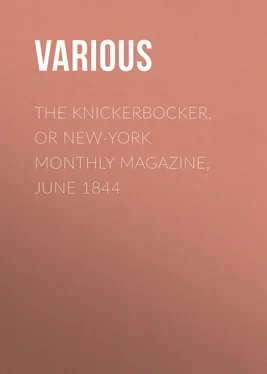Various - The Knickerbocker, or New-York Monthly Magazine, June 1844
Здесь есть возможность читать онлайн «Various - The Knickerbocker, or New-York Monthly Magazine, June 1844» — ознакомительный отрывок электронной книги совершенно бесплатно, а после прочтения отрывка купить полную версию. В некоторых случаях можно слушать аудио, скачать через торрент в формате fb2 и присутствует краткое содержание. Жанр: foreign_antique, periodic, foreign_edu, на английском языке. Описание произведения, (предисловие) а так же отзывы посетителей доступны на портале библиотеки ЛибКат.
- Название:The Knickerbocker, or New-York Monthly Magazine, June 1844
- Автор:
- Жанр:
- Год:неизвестен
- ISBN:нет данных
- Рейтинг книги:5 / 5. Голосов: 1
-
Избранное:Добавить в избранное
- Отзывы:
-
Ваша оценка:
- 100
- 1
- 2
- 3
- 4
- 5
The Knickerbocker, or New-York Monthly Magazine, June 1844: краткое содержание, описание и аннотация
Предлагаем к чтению аннотацию, описание, краткое содержание или предисловие (зависит от того, что написал сам автор книги «The Knickerbocker, or New-York Monthly Magazine, June 1844»). Если вы не нашли необходимую информацию о книге — напишите в комментариях, мы постараемся отыскать её.
The Knickerbocker, or New-York Monthly Magazine, June 1844 — читать онлайн ознакомительный отрывок
Ниже представлен текст книги, разбитый по страницам. Система сохранения места последней прочитанной страницы, позволяет с удобством читать онлайн бесплатно книгу «The Knickerbocker, or New-York Monthly Magazine, June 1844», без необходимости каждый раз заново искать на чём Вы остановились. Поставьте закладку, и сможете в любой момент перейти на страницу, на которой закончили чтение.
Интервал:
Закладка:
But you will ask, ‘And where is she who watched over you during your moments of suffering?—whom you called your guardian angel, and of whose friendship and love you spoke in such feeling terms?’ I reply, that she sits even now at my side; her handsome and intelligent countenance reading in my face the varied emotions to which the tracing of these lines give rise. Devoted Aleukâ is my loving and much-loved wife.
J. P. B.A SONG
Time was I thought that precious name
Less meet for Court than Alley;
But now, no thrilling sound hath Fame,
No clarion note, like Sally!
There seems at first, within the word,
Some cause to smile, or rally;
But once by her sweet glance preferr’d,
Ev’n Heaven itself loves Sally!
The world moves round when move her Eyes,
Grace o’er each step doth dally,
The breath is lost in glad surprize;
There is no belle, like Sally!
Old hearts grow young, off flies the gout,
Time stops, his Glass to rally;
I hardly know what I’m about—
When lost in thought on Sally!
Sometimes she’s small, sometimes she’s tall,
I can’t tell how, vocally;
For there’s a spirit over all,
That beams abroad from Sally!
A spirit bright, a beam of light,
Ah! fear not that I rally—
No man can Evil think in sight
Of this pure-hearted Sally!
And yet Time was, I thought the name
For Court less fit, than Alley;
While now, no herald sound hath Fame,
No clarion note, but Sally!
REMINISCENCES OF A DARTMOOR PRISONER
Under the circumstances related in my last number, it will readily be inferred that sleep was out of the question. The only alternative was to sit or lie down and meditate upon the next change which might befal us. There was but little disposition for merriment at such a time and place; yet there was one man, named John Young, but called by his companions ‘Old John Young,’ who in despite of empty stomach and aching limbs, amused himself and annoyed all others by singing a line of one and a verse of another, of all the old songs he could recollect from his earliest boyhood; dispensing his croaking melody with such untiring zeal as to keep the most weary awake had they been inclined to sleep.
At break of day we began to try to move about, and gradually straighten ourselves, which was something of an effort, stiffened and benumbed as we were with remaining in our wet clothing so many hours. We had now an opportunity of examining our habitation. It was a building of about four hundred feet long, by seventy-five or eighty wide, three stories high, and built of stone, with massive doors and strongly-grated windows, the floors being of stone or cement, and perfectly fire-proof. Each floor formed one entire room, except being divided by five rows of posts running the whole length of the building, by which the prisoners slung their hammocks. The prisoners were divided off in ‘messes’ or families of six or eight, each occupying room sufficient to sit around one of their chests, which usually served as a mess-table. One row or tier of these messes were ranged next to the walls on each side, and two rows down the centre, back to back, as it were, leaving two avenues, or thoroughfares, the whole length of the building. The entire arrangement resembled the stalls in a stable, more than any thing else I can compare it to.
There were seven of these prisons, all of about the same size and construction, one of which was not occupied. The whole was enclosed in a circular wall of about twenty feet high, and covering a space of from eight to ten acres of ground. This was divided in three parts by a wall similar to the outside one. The centre yard was occupied by No. 7, allotted to the colored prisoners, and the other two yards had three prisons in each. On the outside wall were platforms and sentry-boxes at short distances, for the guards. About fifteen feet within that wall was a high iron railing. In front of the main entrance was a large square, used for drilling soldiers and other purposes, and twice a week as a market for the country people; and on each side of this were the barracks and hospital, and in front of these were the officers’ quarters. This dépôt was situated upon a hill, surrounded by a vast common of many miles in extent, without a bush or tree to relieve the dreary waste; and from its elevated position it was generally shrouded by clouds, rendering it chilly and uncomfortable the greater part of the year.
The daily allowance of food consisted of a pound of beef, a pint of soup, and a pound of bread to each man; that is to say, at the rate of one hundred pounds of raw beef to an hundred men. The meat was cut up and put into large boilers, with sufficient barley to thicken it for soup. This was boiled until the meat would leave the bone, and the barley was well cooked; and when ready, was served up to the different messes. By the time each person got his beef it was almost too small to be seen, being shrunk up by long boiling; and the bone being taken out, it was no larger than a small-sized tea-cup. The pound of bread was not much larger: it was made of barley, slack-baked, and very dark, though sweet. Indeed it was good enough, what there was of it. On Fridays the fare was varied by the same amount in fish and potatoes.
As some require more nutriment than others, the same quantity of fare did not satisfy all the prisoners alike. I frequently saw many of them devour their day’s allowance at one meal without appeasing their hunger; and before the next day’s rations were served out, they would be almost frantic from starvation. Some became so exhausted that they were compelled to go to the hospital until they recovered strength. Those who possessed a little money fared somewhat better, as they could indulge in the luxury of bullock’s liver, fried in water for the want of fat, or a hot pumgudgeon fried in the same material. This exquisite dish is not appreciated according to its merits. It commonly bears the undignified title of ‘codfish-balls;’ and is well known at the present day among our eastern brethren, though not held in the same veneration by them as clam-chowder. ‘Dartmoor pippins,’ or potatoes, were also held in high estimation with us.
Dartmoor prison was a world in miniature, with all its jealousies, envyings and strife. How shall I describe the scenes enacted within its walls? how portray the character of its inhabitants? If I but held the pen of Dickens or the pencil of Mount, I might hope so to bring the objects before the mind’s eye of the reader, that they would stand forth in full relief, inducing him almost to imagine that he stood in their midst. Though many years have rolled by since those events occurred, they still linger in my memory like the vivid scenes of a high-wrought drama; and often in the ‘dead waste and middle of the night’ do I revisit in my dreams scenes which I should be sorry to survey when awake.
I think it one of the greatest blessings granted by an all-wise and benevolent Creator, that He has bestowed upon man an intellectual and physical capacity, which enables him to pass in comparative happiness many a lonely hour. Many were the aërial maps and charts laid down for our future journeyings through life, and plans formed, which were never to be realized. And perhaps all was for the best; for we are all creatures of circumstance. Not one in a thousand follows out his plans through life. Half of our existence is imaginary; and wise-acres may scoff as much as they please at what they term ‘castle-building,’ I believe all mankind indulge in it more or less; and it is an innocent, harmless pastime, which injures no one. I consider it the ‘unwritten poetry,’ the romance of life, which all feel; but many, like the dumb, strive in vain to give utterance to their thoughts.
Читать дальшеИнтервал:
Закладка:
Похожие книги на «The Knickerbocker, or New-York Monthly Magazine, June 1844»
Представляем Вашему вниманию похожие книги на «The Knickerbocker, or New-York Monthly Magazine, June 1844» списком для выбора. Мы отобрали схожую по названию и смыслу литературу в надежде предоставить читателям больше вариантов отыскать новые, интересные, ещё непрочитанные произведения.
Обсуждение, отзывы о книге «The Knickerbocker, or New-York Monthly Magazine, June 1844» и просто собственные мнения читателей. Оставьте ваши комментарии, напишите, что Вы думаете о произведении, его смысле или главных героях. Укажите что конкретно понравилось, а что нет, и почему Вы так считаете.












